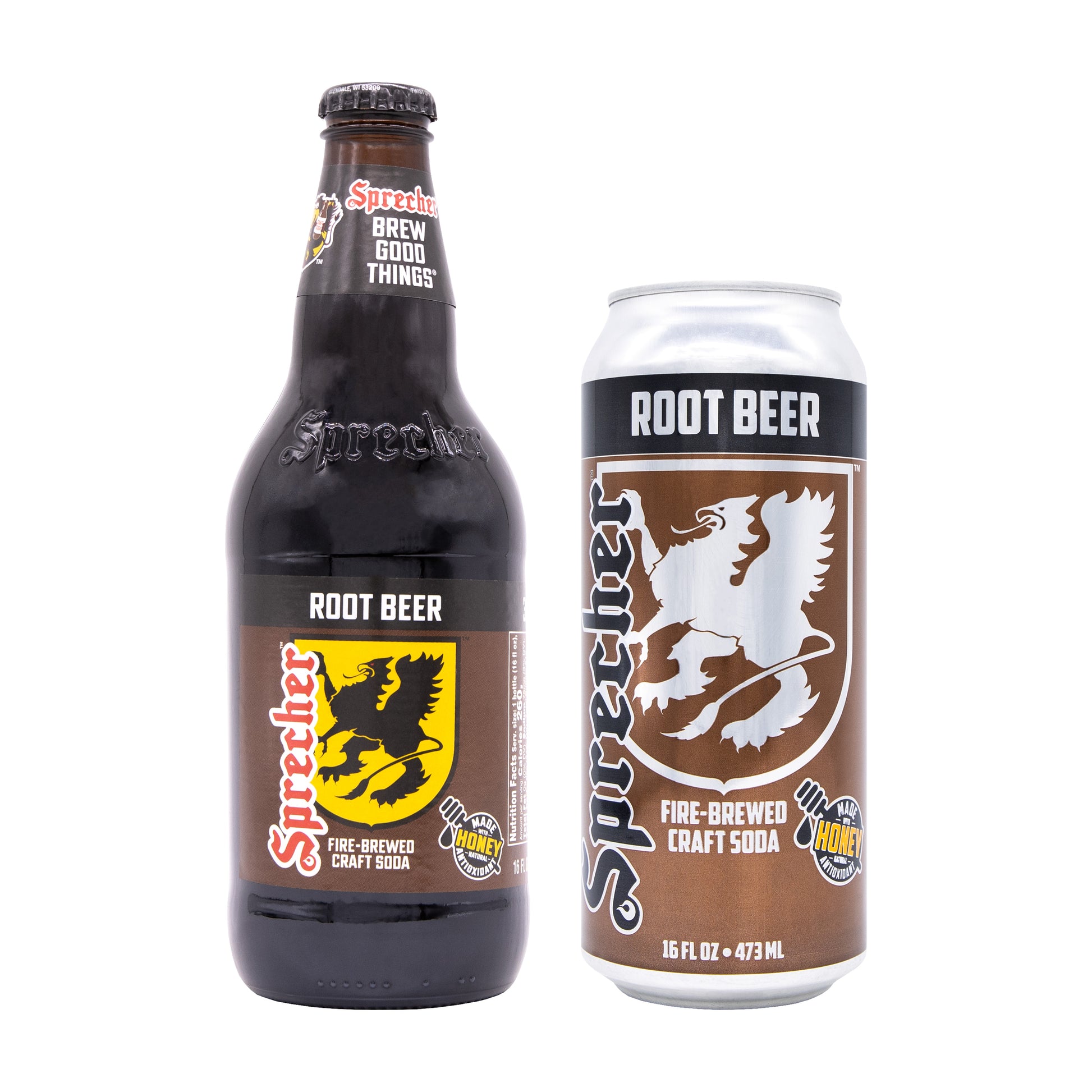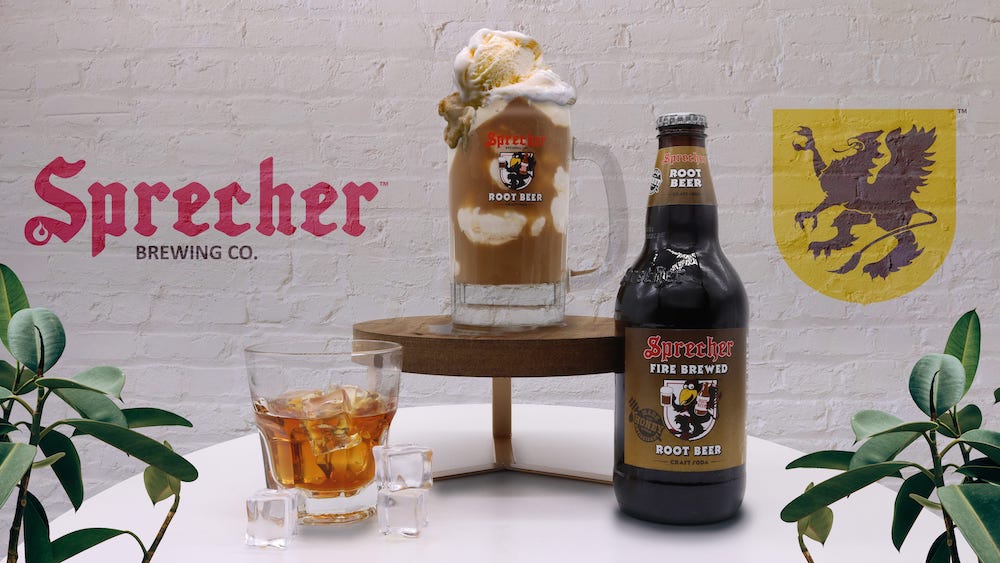Sprecher Root Beer has beer right there in the name. And beer, by and large, contains alcohol. So you might be wondering, does Sprecher Root Beer contain alcohol?
While there are exceptions to the rule, Sprecher Root Beer and root beer in general is naturally alcohol-free. Root beer is a delicious non-alcoholic option if you are sober, taking part in Dry January, or just want a family-friendly treat for all ages.
To understand why Sprecher Root Beer does not contain alcohol, it's helpful to dig into both the origin of both root beer and Sprecher's fire-brewed craft version.
If you guessed that the etymology of root beer might have something to do with real beer, you guessed right. For a deeper dive, read Sprecher's authoritative history of root beer. The short version: Alcohol-free root beer evolved out of the tradition of European "small beer," or what we might call near bear or even "session beer" today.
The evolution of non-alcoholic root beer
Small beers were low-alcohol beers (hovering at 1-2% ABV). Starting from a medieval tradition, Europeans brewed small beers because they were safer than water, cheap, nutritious and unlikely to get you too drunk during the day. Small beer was made by shortening the fermentation time of the brew or by re-using grain from a stronger beer.
(Side note: In 1997, Anchor Brewing temporarily revived the millenia-old tradition with Anchor Small Beer, crafting a 3.3 ABV brew that landed somewhere between a near beer and a session beer. It is no longer in production. Anchor Small Beer may have been simultaneously both ancient and ahead of its time.)
After traveling to the American continent, Europeans observed indigenous people using roots, barks and berries for health benefits. They built on this tradition and made small beer using Sassafras and Sarsaparilla roots to brew what they named root beer. They drank root beer to hydrate safely and, as often was the case with early sodas, for real or perceived medicinal benefits.
In the 1870s, Charles Hires created the first commercial version of root beer. As a Quaker, Hires was deeply opposed to drinking alcohol. So he marketed “powder root tea” to local miners, who were known for their love of a boozy after-work drink. Wisely, Hires eventually re-branded his drink as "root beer" in a bid to appeal to the masculine sensibilities of these miners.
Other companies subsequently jumped on the NA root beer bandwagon, notably Barq’s and A&W root beer in the late 1800s and early 1900s. When prohibition hit, the demand and availability for non-alcoholic root beer went way up, and the rest is history.
A similar evolution happened with non-alcoholic ginger beer and ginger ale. Originally, ginger beer was fermented and often fit in the "small beer" category. Then in the early 1900s, a brand called Canada Dry popularized an NA version, which coincided with Canadian prohibition.
The rise of Sprecher non-alcoholic root beer

Similarly, Sprecher Root Beer evolved from roots (no pun intended) that began with actual craft beer.
The story begins with Sprecher's founder, Randy Sprecher. Back when he was still living in California, Randy would brew up batches of root beer on his wood stove for his daughter, Kecia. He would experiment with small-batches to find the best flavors, and bring root beer to drink on backcountry hikes. (Kecia Sprecher still works at her namesake brewery to this day, now serving as vice president.)
When Randy moved to Wisconsin and opened Sprecher Brewery in 1985, he originally focused entirely on growing the business with European-inspired ales and lagers, such as Special Amber and Black Bavarian lager. Sprecher still brews these award-winning beers today, along with other favorites like Abbey Triple and Oktoberfest.
One of the ways he grew the brand was by leading brewery tours with all-you-can-drink affairs. These tours were appealing to beer geeks and adults, but not so much to the children who would sometimes tag along.
Remembering the small batch root beers he brewed up for his daughter Kecia, Randy started offering non-alcoholic root beer for underage visitors to enjoy on these tours. A craft brewer through and through, Randy applied the tools and techniques of his craft to make the best soda, including fire-brewing the small batches.
Sprecher's Root Beer -- and subsequently its later line of craft soda -- also came packaged in the same style of 16-ounce bottle that were used for Sprecher craft beer. The embossed bottles made Sprecher Root Beer feel like a special occasion drink, elevated from the mass-market 12-ounce cans. Root beer became an extension of the craft beverages Sprecher became known for, without the alcohol.
And root beer became a hit!
Randy started to sell root beer outside of brewery tours, and Sprecher Root Beer quickly became a favorite. Today, Sprecher Root Beer is the brewery's No. 1 seller by a long shot, and it has been named the best root beer in America by The New York Times, Tasting Table and many others.
All that root beer deliciousness started as a simple alternative to alcohol.
When does root beer contain alcohol?
As noted earlier, root beer naturally does not contain alcohol, and it's also caffeine and gluten free. But there are exceptions to the rule, such as when caffeine or alcohol are intentionally added back to the formula to create energy drinks or hard sodas.
In the beverage space, variety is the name of the game, which is also true with root beer. Today, you can find Sprecher Root Beer in a variety of styles, all delicious: Bottles, cans, low-calorie, caffeinated (Rev'd Up Root Beer) and maple –– you can even make your own with Sprecher Root Beer syrup extract.
In recent years, one of the more popular flavors of root beer is hard root beer, which contains alcohol. In 2013, Sprecher released its own version of hard root beer.
According to a press release at the time, Sprecher Hard Root Beer was described as having "all the flavors and characteristics of Sprecher Root Beer nicely melded with bourbon and oak flavors."
“We had a lot of customers asking for a hard root beer," said Jeff Hamilton, then president of Sprecher. "Since this is a variation of what we do best, two of our Wisconsin distributors — Beechwood Sales and Service and General Beverage — suggested a limited initial roll out to test markets. That will let us know if we need to change anything before we go into large scale production.”
Over the next few years, the popularity of hard sodas and hard root beer rose exponentially and then quickly fell again, as consumer preferences for sweet drinks with alcohol fluctuated.
Currently, hard sodas and the category of "flavored malt beverages" (FMBs) are undergoing a resurgence, according to Wine Enthusiast, even if it's not reaching the heights of its mid-2010s apex.
Today, Sprecher currently offers hard root beer in our taproom for tours and to-go crowlers and growlers. You can also experiment and make your own hard root beer or hard root beer float at home with our recipe.
Sodas vs. Hard Sodas: Read the label
With the return of more varieties of hard sodas, it's important to make sure to read the label to make sure you're getting what you want, whether that's soda with alcohol or root beer without alcohol.
Are you sure that's a regular Mountain Dew you picked up, or does the angry-looking mascot belong to Hard Mountain Dew? Sometimes it may be hard to tell.
To clear up any confusion, though, Sprecher's new 16-ounce cans say that our root beer is alcohol free on the label.
So raise your bottle, can or glass to non-alcohol root beer. NA cheers!





























